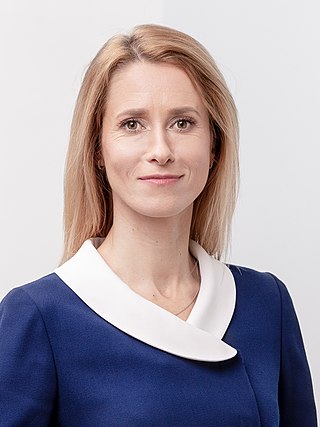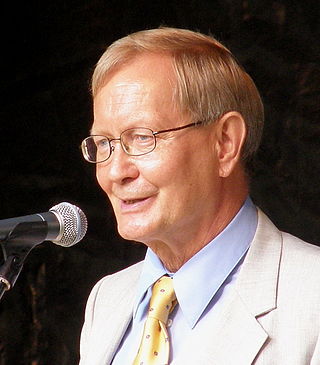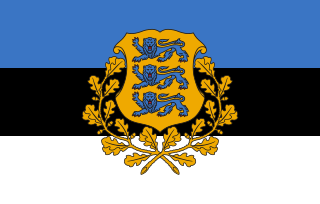Kalle Kulbok (born 3 April 1956 in Tallinn) is an Estonian politician.
Kalle Kulbok (born 3 April 1956 in Tallinn) is an Estonian politician.
Kulbok attended the Nõo Gymnasium and achieved good results on national olympiads of mathematics. By his skills, he could have qualified for the all-Union olympiad of mathematics; however, due to his displayed lack of respect for Soviet politics, he was never selected for that round.
In 1992–1995, Kulbok belonged to Riigikogu as a member of the Independent Royalist Party of Estonia. In 1995, Kulbok was not allowed to run for Riigikogu because he refused to swear allegiance to Republic of Estonia.
In later years, his political activity has mainly involved Euroskepticism. [1] He's earned notoriety by several interesting actions, most notably by having himself pilloried for failure to derail Estonia's entry to European Union, and his declaration of revocation of his Estonian citizenship. As of 2007, Kulbok is the only natural-born citizen of Estonia known to have voluntarily requested revocation of his citizenship without naturalising in another country.
On 19 September 2003, Kulbok petitioned the Supreme Court of Estonia to declare the referendum for Estonia's joining European Union unconstitutional. The Supreme Court refused to consider the matter, arguing that only President of Estonia can rightfully present such a petition.
For many years, Kulbok worked as a specialist at EENet.
Politics in Estonia takes place in a framework of a parliamentary representative democratic republic, whereby the Prime Minister of Estonia is the head of government, and of a multi-party system. Legislative power is vested in the Estonian parliament. Executive power is exercised by the government, which is led by the prime minister. The judiciary is independent of the executive and the legislature. Estonia is a member of United Nations, the European Union, and NATO.

Siim Kallas is an Estonian politician, former Prime Minister of Estonia, and former European Commissioner. He served as the European Commissioner for Transport between 2010 and 2014. Before that he was the European Commissioner for Administrative Affairs, Audit and Anti-Fraud between 2004 and 2009. In both Barroso Commissions he was also a Vice-President. He was twice appointed the Acting Commissioner for Economic and Monetary Affairs and the Euro in Olli Rehn's stead, from 19 April 2014 to 25 May 2014 while he was on electoral campaign leave for the 2014 elections to the European Parliament and from 1 July 2014 to 16 July 2014 after he took up his seat.

Juhan Parts is an Estonian politician who was Prime Minister of Estonia from 2003 to 2005 and Minister of Economic Affairs and Communications from 2007 to 2014. Juhan Parts is a member of Isamaa party.

Edgar Savisaar was an Estonian politician, one of the founding members of Popular Front of Estonia and the Centre Party. He served as the acting Prime Minister of Estonia, Minister of the Interior, Minister of Economic Affairs and Communications, and twice mayor of Tallinn.

The prime minister of Estonia is the head of government of the Republic of Estonia. The prime minister is nominated by the president after appropriate consultations with the parliamentary factions and confirmed by the parliament (Riigikogu). In case of disagreement, the Parliament can reject the president's nomination and choose their own candidate. In practice, since the prime minister must maintain the confidence of Parliament in order to remain in office, they are usually the leader of the senior partner in the governing coalition. The current prime minister is Kaja Kallas of the Reform Party. She took the office on 26 January 2021 following the resignation of Jüri Ratas.

The Riigikogu is the unicameral parliament of Estonia. In addition to approving legislation, the Parliament appoints high officials, including the Prime Minister and Chief Justice of the Supreme Court, and elects the President. The Riigikogu also ratifies significant foreign treaties that impose military and proprietary obligations, bring about changes in the law, etc.; approves the budget presented by the government as law and monitors the executive power.

Konstantin Päts was an Estonian statesman and the country's president in 1938–1940. Päts was one of the most influential politicians of the independent democratic Republic of Estonia, and during the two decades prior to World War II he also served five times as the country's prime minister.
Estonia elects a legislature on the national level. The Riigikogu has 101 members, elected for a four-year term by proportional representation. A head of state – the president – is elected for a five-year term by parliament or an electoral college. Locally, Estonia elects local government councils, which vary in size. Election law states the minimum size of a council depending on the size of municipality. Local government councils are elected by proportional representation too.

Tunne-Väldo Kelam is an Estonian politician and former Member of the European Parliament (MEP) from Estonia. He is a member of the Pro Patria and Res Publica Union, part of the European People's Party.

The president of the Republic of Estonia is the head of state of the Republic of Estonia. The current president is Alar Karis, elected by Parliament on 31 August 2021, replacing Kersti Kaljulaid.

Andrus Ansip is an Estonian politician, a member of the European Parliament, the former European Commissioner for Digital Single Market and Vice President of the European Commission, in office from 2014 until 2019. Previously, he was Prime Minister of Estonia from 2005 to 2014 and chairman of the liberal Estonian Reform Party from 2004 to 2014.
United States v. Bhagat Singh Thind, 261 U.S. 204 (1923), was a case in which the Supreme Court of the United States decided that Bhagat Singh Thind, an Indian Sikh man who identified himself as an Aryan, was ineligible for naturalized citizenship in the United States. In 1919, Thind filed a petition for naturalization under the Naturalization Act of 1906 which allowed only "free white persons" and "aliens of African nativity and persons of African descent" to become United States citizens by naturalization.

Enn Tarto was an Estonian politician who was a leading dissident during the Soviet occupation of Estonia. He was imprisoned from 1956 to 1960, 1962 to 1967, and again from 1983 to 1988 for anti-Soviet activity.
Estonia has recognised same-sex registered partnerships since January 1, 2016. These unions provide same-sex couples with some of the rights, benefits and obligations of marriage.

Igor Gräzin is an Estonian politician, long-time member of Riigikogu and former Member of the European Parliament. He was a member of the Reform Party until 2019, and joined the Centre Party in 2022. An Eurosceptic, he was a dissenting voice in the strongly pro-EU Reform Party. He was the only member of Riigikogu to vote against ratifying the Treaty establishing a Constitution for Europe.
The Supreme Court of Estonia is the court of last resort in Estonia. It is both a court of cassation and a constitutional court. The courthouse is in Tartu.
The Congress of Estonia was an innovative grassroots parliament established in Estonia in 1990–1992 as a part of the process of regaining of independence from the Soviet Union. It also challenged the power and authority of the pre-existing quasi-parliament in the country, called the Supreme Soviet of the Estonian SSR, which had been imposed on Estonia after the Soviet invasion, occupation and illegal annexation of Estonia in 1940. The Congress of Estonia declared that it represented the highest authority on questions of Estonian statehood and citizenship, deriving this authority from the consent and initiative of the citizens of Estonia. The aim of the Congress was to restore Estonian independence based on the principle of legal continuity, with the pre-1940 Republic of Estonia, which had been established in 1918, as the foundation.
The Estonian Sovereignty Declaration, fully: Declaration on the Sovereignty of the Estonian SSR, was issued on November 16, 1988 during the Singing Revolution in Soviet Estonia. The declaration asserted Estonia's sovereignty and the supremacy of the Estonian laws over the laws of the Soviet Union. Estonia's parliament also laid claim to the republic's natural resources: land, inland waters, forests, mineral deposits and to the means of industrial production, agriculture, construction, state banks, transportation, municipal services, etc. in the territory of Estonia's borders. November 16 is now celebrated annually as the "Day of Declaration of Sovereignty".
Priit Pikamäe is an Estonian lawyer who has been the President of the Supreme Court of Estonia in 2013-2019 and now serves as an Advocate-General of the European Court of Justice.
Electoral district no. 10 was one of the multi-member electoral districts of the Riigikogu, the national legislature of Estonia. The district was established in 1992 when the Riigikogu was re-established following Estonia's independence from the Soviet Union. It was abolished in 1995. It was conterminous with the county of Tartu.